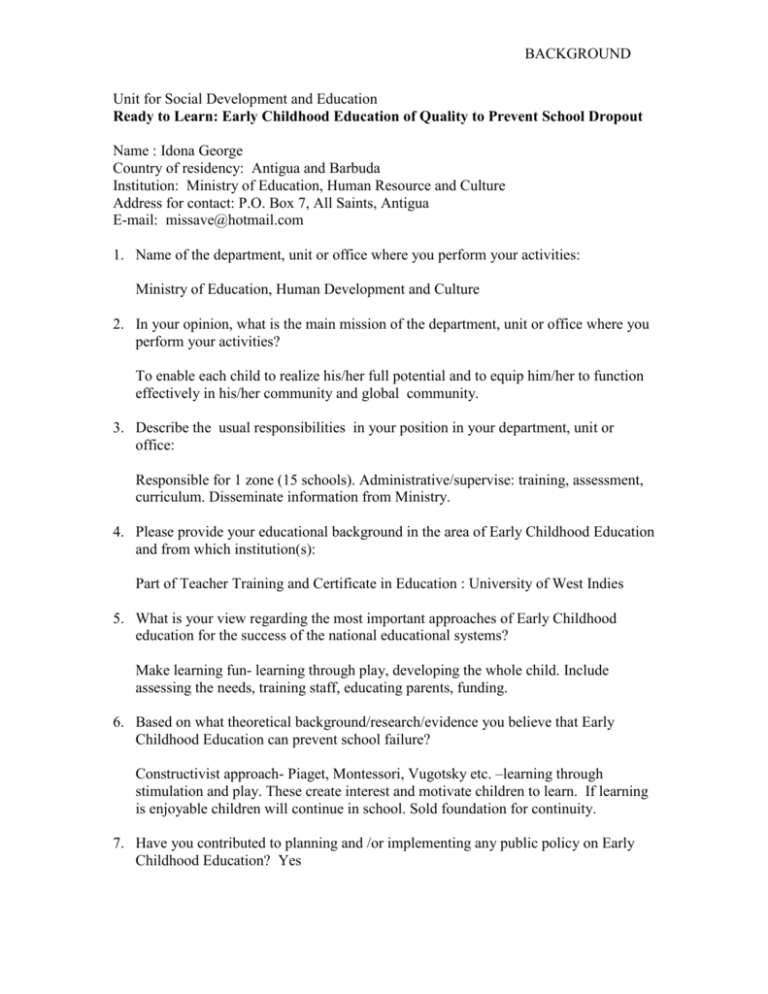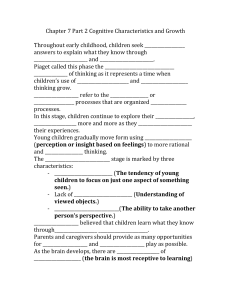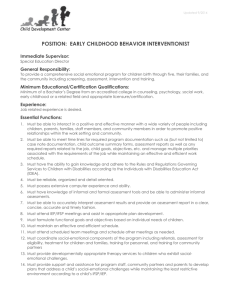Ready to Learn
advertisement

BACKGROUND Unit for Social Development and Education Ready to Learn: Early Childhood Education of Quality to Prevent School Dropout Name : Idona George Country of residency: Antigua and Barbuda Institution: Ministry of Education, Human Resource and Culture Address for contact: P.O. Box 7, All Saints, Antigua E-mail: missave@hotmail.com 1. Name of the department, unit or office where you perform your activities: Ministry of Education, Human Development and Culture 2. In your opinion, what is the main mission of the department, unit or office where you perform your activities? To enable each child to realize his/her full potential and to equip him/her to function effectively in his/her community and global community. 3. Describe the usual responsibilities in your position in your department, unit or office: Responsible for 1 zone (15 schools). Administrative/supervise: training, assessment, curriculum. Disseminate information from Ministry. 4. Please provide your educational background in the area of Early Childhood Education and from which institution(s): Part of Teacher Training and Certificate in Education : University of West Indies 5. What is your view regarding the most important approaches of Early Childhood education for the success of the national educational systems? Make learning fun- learning through play, developing the whole child. Include assessing the needs, training staff, educating parents, funding. 6. Based on what theoretical background/research/evidence you believe that Early Childhood Education can prevent school failure? Constructivist approach- Piaget, Montessori, Vugotsky etc. –learning through stimulation and play. These create interest and motivate children to learn. If learning is enjoyable children will continue in school. Sold foundation for continuity. 7. Have you contributed to planning and /or implementing any public policy on Early Childhood Education? Yes BACKGROUND 8. What is the role you have you played in the development and consolidation of Early Childhood Education Policies and Programs? Supervising teachers in the infant department (5-7yrs) of primary schools. 9. What areas of Early Childhood Education are interested and /or working on? (e.g.: accreditation of instructors/facilities, training, parent’s education) Sensitizing and educating public; training staff and educating parents; facilities. 10. How do you think the Ready to Learn workshop will contribute to the goals of improving and developing Early Childhood education programs as well as to prevent school dropout and promoting equity and quality of education? Provided relevant and up-to-date information regarding research in areas such as neuro-science and diversity; reinforce idea that early stimulation to learning motivate students to learn and continue in school. 11. In you countries, children of what ages receive Early Childhood Education Services and what percentage of these services is public provided and what percentage of these is provided by the private sector? The government does not own pre-schools (below 5 yrs). The primary school caters for 5-7yr (Infant Dept.) Health care for all children under 12 is provided through the Ministry of Health. Nursery and Preschools are privately owned 12. What strategies do you intend to use this year, upon returning to your country, to adequately transfer the theoretical and practical experience acquired during the Ready to Learn workshop to the reality of your country? Seminars, workshops, literature-media, pamphlets, etc. to assess needs and to disseminate information. Thank you for answering the questions and please return to: Jorge Baxter Dr. Gaby Fujimoto e-mail: jbaxter@oas.org e-mail: gfujimoto@oas.org







